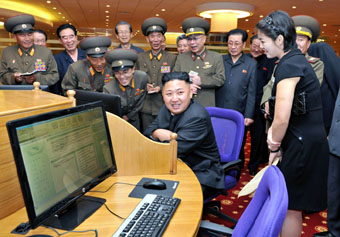
U.S. to Impose Sanctions on N. Korea
| published January 3, 2015 |
By Thursday Review staff
Convinced that North Korea was behind the cyber-attacks which crippled Sony Pictures Entertainment last month, U.S. President Barack Obama announced a new battery of sanctions against the rogue nation this week.
The FBI and the White House—along with other independent and private investigations—have pointed the finger of blame squarely at Pyongyang, and its elite military unit trained for cyber war. In November, a group calling itself the Guardians of Peace hacked its way into the computer network of Sony Pictures’ Culver City, California studios and corporate offices. In addition to commandeering the company’s network, the group then apparently stole tens of thousands of emails, thousands of documents, and a dozen digital copies of films. It was one of the worst, most destructive cyber-attacks in recent history.
Suspicion immediately turned toward North Korea because of its threats against Sony for the production of the movie The Interview, a comedy in which two TV journalists, played by Seth Rogen and James Franco, are recruited by the CIA to assassinate Kim Jon-un. North Korea called the film ac act of war, and promised punishment and retribution if it were to be released. Though North Korea has officially denied any involvement in the cyber-attack, the government of the isolated nation has applauded the hacking and theft of files.
The announcement of sanctions is the first public response to the Sony cyber-attack since the FBI and the White House confirmed that they had traced the assault to North Korea. The President had vowed to retaliate in a proportional response, but it was not clear how the U.S. would respond. Last week, North Korea experienced a sustained and widespread internet outage which lasted between five and seven hours. The outage affected nearly all internet activity in the country, and when reports reached the outside world many assumed that the shutdown was the result of action by the United States. But American officials remained silent, and some were left to assume that some agency or bureau of the U.S. government was behind the shutdown. But others speculated that the internet outage was the result of other hacker groups with an ax to grind against North Korea’s interference in free speech and freedom of expression.
No matter, with the White House and the FBI (as well as other U.S. agencies) in agreement that the cyber-attack on Sony was orchestrated and carried out by North Korea, this new round of sanctions was meant to answer the ongoing question of what action would be taken in response to the original attack.
North Korea, which already lives its life under a heavy blanket of sanctions dating back more than a generation, is now facing punishments similar to some of those being directed at Russia for its intervention in the Ukraine. The United States will use new sanctions to target North Korean military intelligence and military computer intelligence, as well as ten individuals with direct or indirect connections to Pyongyang’s nuclear program, rocket and missile technologies, and weapons sales and acquisitions.
The U.S. State Department and the White House concede that traditional forms of sanctions against North Korea are pointless, since the nation allows few people to travel into the country, and even fewer of its own citizens to leave. Many North Koreans already live under harsh conditions, with limited access to electricity, extreme forms of rationing, and no access to the outside world via television, cell phones, or the internet. But since Pyongyang rewards those who support the regime’s military ambitions, the new U.S. sanctions are meant as a way to punish those who have curried favor with top government officials and North Korean leader Kim Jong-Un.
Sanctions have also been imposed on several North Korean business and trade entities, including Korea Tangun Trading Corporation, Korea Mining Development Corporation, and several top government agencies and bureaus associated with military intelligence. The U.S. State Department, the U.S. Treasury Department, and the White House say that the two “companies” being hit with sanctions are little more than business tools for the acquisition of weapons and nuclear materials.
Pyongyang has largely ignored international pressure and sanctions, and has instead declared itself unwilling to abandon its efforts to develop rockets and missiles capable of delivering nuclear weapons. North Korea has also persisted for decades with its threats against South Korea, and against Japan and other U.S. allies in the Asian region.
Related Thursday Review articles:
Seoul and Tokyo to Share Intelligence on N. Korea; R. Alan Clanton; Thursday Review; December 29, 2014.
Was It Worth All The Fuss?; Thursday Review staff; Thursday Review; December 26, 2014.
